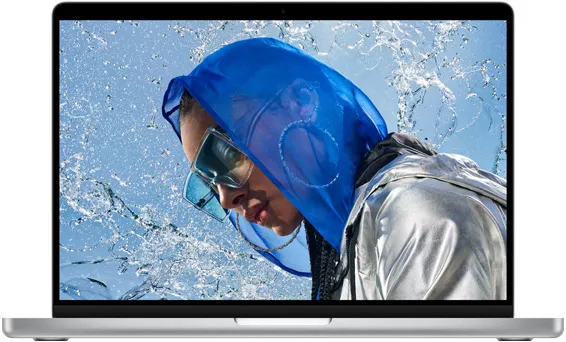Apple users will soon be able to get their hands on the latest MacBook Pro options with a new M1 Pro and M1 Max chip. There are quite a few customization options for each version of the new MacBook Pro that allow users to expand their performance, memory, and storage capabilities. Here are the MacBook M1 Pro and MacBook Pro M1 Max specs, screen size, and dimensions.
MacBook M1 Pro

Specs
The M1 Pro chip on the $1,999 base-model 14-inch MacBook Pro features some key aspects including:
- An eight-core CPU with six performance cores and two efficiency cores
- 14-core GPU
- 16-core Neural Engine
- 200GB/s memory bandwidth
M1 Pro chips on the $2,499 base-model 14-inch MacBook M1 Pro and both 16-inch MacBook M1 Pro options include a beefier 10-core CPU with eight performance cores and two efficiency cores, and a 16-core GPU rather than 14. The 14-inch MacBook M1 Pro and both of the 16-inch MacBook M1 Pro options feature the same 16-core Neural Engine and 200GB/s memory bandwidth.
All MacBook M1 Pro options include the same media engine specs including:
- Hardware-accelerated H.264, HEVC, ProRes, and ProRes RAW
- Video encode and decode engines
- ProRes encode and decode engine
Unified memory is Apple’s version of RAM, and each version of the MacBook M1 Pro includes 16GB of this unified memory. However, the unified memory is upgradeable up to 32GB for an additional cost of $400.
The MacBook M1 Pro also features a backlit Magic Keyboard with Touch ID, an ambient light sensor, and a Force Touch trackpad that supports pressure-sensing, enables force clicks, accelerators, and Multi-Touch gestures.
All MacBook M1 Pro options include the same charging and expansion features including:
- SDXC card slot
- HDMI port
- 3.5-millimeter headphone jack
- MagSafe 3 port
- Three Thunderbolt 4 (USB-C) ports that support charging, DisplayPort, Thunderbolt 4 up to 40Gb/s, and USB 4 up to 40Gb/s
Camera and audio
Apple’s MacBook M1 Pro options also include a 1080p FaceTime HD camera, an advanced image signal processor, wide stereo sound, and support for spatial audio with Dolby Atmos and AirPods (3rd Generation), AirPods Pro, and AirPods Max.
Battery
A 70Wh lithium-polymer battery powers the 14-inch MacBook M1 Pro, which should last up to 17 hours of Apple TV app movie playback and up to 11 hours of wireless web use, according to Apple. Fast-charging is also supported with the 96W USB-C power adapter that comes included with the MacBook M1 Pro.
For the 16-inch MacBook M1 Pro, there is a 100Wh lithium-polymer battery that can handle up to 21 hours of Apple TV playback and 14 hours of wireless web searching. Fast-charging is again supported with the included 140W USB-C power adapter.
Screen size
The Liquid Retina XDR display on the 14-inch model of the MacBook M1 Pro measures 14.2 inches, and the 16-inch model has a 16.2-inch display. The former features a 3024×1964 resolution at 254 PPI, whereas the 16-inch display features 3456×2234 resolution at 254 PPI. Both displays support up to 1,000 nits of sustained brightness and 1,600 nits peak brightness. The MacBook M1 Pro options also use True Tone technology and include ProMotion technology that supports adaptive refresh rates up to 120Hz.
Dimensions
Apple’s new 14-inch MacBook M1 Pro measures 0.61 inches tall, 12.31 inches wide, and 8.71 inches long. It weighs 3.5 pounds, which is a half-pound heavier than the previous MacBook Pro 13.3-inch model.
The 16-inch variant of the MacBook M1 Pro measures 0.66 inches tall, 14.01 inches wide, and 9.77 inches long. The M1 Pro version of this laptop weighs 4.7 pounds.
MacBook Pro M1 Max

Specs
Apple’s high-end MacBook Pro M1 Max comes with much more powerful components than the MacBook M1 Pro including:
- 10-core CPU with eight-performance cores and two efficiency cores
- 32-core GPU
- 16-core Neural Engine
- 400GB/s memory bandwidth
The MacBook Pro M1 Max uses the same media engine as the MacBook M1 Pro. However, it features two video encode engines and two ProRes encode and decode engines.
As far as memory is concerned, the MacBook Pro M1 Max comes with 32GB of unified memory (RAM) with an option to increase the capacity to 64GB.
Storage should be no issue with the lowest storage option for the MacBook Pro M1 Max being one TB. However, users can choose to expand that storage with two, four, or eight terabyte storage options for an additional cost of up to $2,400.
Apple’s MacBook Pro M1 Max features the same charging and expansion options as the MacBook M1 Pro version, which means it also includes:
- SDXC card slot
- HDMI port
- 3.5-millimeter headphone jack
- MagSafe 3 port
- Three Thunderbolt 4 (USB-C) ports that support charging, DisplayPort, ThunderBolt 4 up to 40Gb/s, and USB 4 up to 40Gb/s
Touch ID is enabled on the backlit Magic Keyboard along with an ambient light sensor and Apple’s Force Touch trackpad, which supports pressure-sensing, force clicks, accelerators, and Multi-Touch gestures.
Camera and audio
The MacBook Pro M1 Max uses the same 1080p FaceTime HD camera as the MacBook M1 Pro as well as the same audio features, like wide stereo sound and spatial audio with Dolby Atmos.
Battery
Inside this new device is a 100Wh lithium-polymer battery that uses a USB-C to MagSafe 3 cable for charging. For those interested in how long the new MacBook Pro M1 Max will last, it is capable of up to 21 hours of Apple TV playback and up to 14 hours of wireless web use. Fast charging is supported with the included 140W USB-C power adapter.
Screen size
A 16.2-inch Liquid Retina XDR display comes stock on the MacBook Pro M1 Max with a 3456×2234 resolution at 254 PPI. Like the 16-inch MacBook M1 Pro, the M1 Max features True Tone technology and ProMotion technology that supports adaptive refresh rates up to 120Hz.
Dimensions
The 16-inch MacBook Pro M1 Max measures .66 inches tall, 14.01 inches wide, and 9.77 inches long. While it fits the same dimensions as the 16-inch MacBook M1 Pro, it does weigh a bit more at 4.8 pounds.
Apple’s new MacBook M1 Pro and MacBook Pro M1 Max launch on Oct. 26.












Published: Oct 20, 2021 12:33 pm